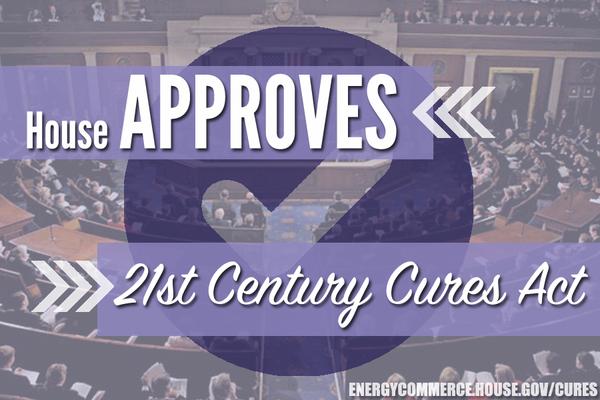Victory with Passage of 21st Century Cures Bill
 We’re pleased to announce that the 21stCentury Cures Bill has passed in the House of Representatives with a 344-77 vote. The bill guarantees increased NIH funding over five years and will ensure greater investment in research, including research on kidney disease.
We’re pleased to announce that the 21stCentury Cures Bill has passed in the House of Representatives with a 344-77 vote. The bill guarantees increased NIH funding over five years and will ensure greater investment in research, including research on kidney disease.Here are some of the key provisions that were included in the 21st Century Cures Bill:
An $8.75 billion increase in research funding over five years at the National Institutes of Health (NIH)
- This new money will give NIH the resources it needs to engage in research that can lead to new cures and treatments for the millions of Americans living with chronic conditions.
- Allows a pathway for patient’s experiences to be collected and used by the FDA when determining the risks and benefits of a product prior to its approval. Patients know best how their disease affects them and how much risk and what type of risk they would be willing to trade for added benefit. This provision will help ensure the FDA takes patients into account when making drug and device approval and labeling decisions.
- One of the biggest barriers to the approval of new kidney disease drugs is the length of time it takes to reach the current FDA endpoint. An endpoint refers an outcome that can be measured as a target in clinical trials, when a direct relationship can’t be measured through a real endpoint, a surrogate endpoints may be used in some cases to establish a relationship between the drug and patient outcomes. For kidney disease, the surrogate endpoint has typically been the doubling of serum creatinine to replace the outcome of kidney failure (57% decline in kidney function based on glomerular filtration rate). The trial design required to reach that surrogate endpoint can take well over five years and are excessively expensive to conduct, making studies in CKD drugs less attractive to manufacturers. In December 2012, NKF and the FDA co-hosted a workshop to discuss potential surrogate endpoints for clinical trials. They concluded that in some kidney disease populations, a 30 or 40% decline in kidney function was adequate to show a high risk of mortality and progression to ESRD. Following that meeting, another study showed that the lesser decline in kidney function, such as 30% over two years, is a strong predictor of progression to ESRD or higher mortality. A consistent and transparent process for how FDA considers and approves the use of new surrogate endpoints may help spur more clinical trials in kidney disease.
- Continuing medical education (CME) is an important component of spurring new ideas for research and innovation. This provision will make it easier for organizations like NKF to provide CME opportunities to practitioners and for practitioners to easily access peer-reviewed journals and medical literature they need to stay on top of new research and studies.